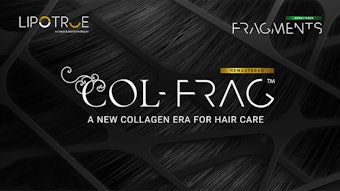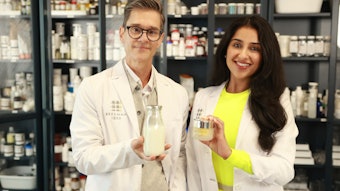
Whether to improve upon the sustainability, accessibility, safety or efficacy of conventional cosmetic ingredients, a wide range of new materials is coming to the market to deliver updated innovation.
Log in to view the full article
Whether to improve upon the sustainability, accessibility, safety or efficacy of conventional cosmetic ingredients, a wide range of new materials is coming to the market to deliver updated innovation.
Case in point: Lignopure GmbH, which was founded in 2019 and leverages lignin as a sustainable ingredient in skin care and other beauty products, recently raised 2.4 million euros in equity capital in addition to previous fundraising.
In collaboration with biorefineries, Lignopure upcycles lignin, a natural polymer found in plants, as a bio-based raw material and alternative to fossil chemicals such as microplastics. In 2022, Lignopure commissioned the first GMP-compliant plant for lignin conversion, reportedly achieving the ability to recycle 90,000 kg of lignin annually.
Lignopure's Upcycled Lignin Cosmetic Ingredients
The company's technologies include LignoBase (lignin/cellulose), a multifunctional cosmetic ingredient line based on Lignopure's particle technology.
LignoBase’s “unique polyphenolic molecular structure” reportedly supports its ability to defend the skin from free radicals and antioxidant activity. It is therefore applicable as an SPF booster in formulations.
Lignobase has reportedly shown a 35-75% in vitro SPF boosting effect in mineral and chemical-based sun care formulations, per the company. The technology can also simplify color cosmetic formulations and reduce the white cast in sun care.
Finally, the technology has a greater oil absorption capacity than kaolin and bentonite, while also providing a soft feel on skin. It therefore is applicable in formulations requiring a mattifying effect.
Lignopure Investment for Microplastic & Petrochemical Alternatives
 From left: Lignopure’s Daniela Arango, Joana Gil Chavez and Wienke Reynolds.Lignopure
From left: Lignopure’s Daniela Arango, Joana Gil Chavez and Wienke Reynolds.Lignopure
“We are very pleased with the trust of our investors,” say Lignopure founders Daniela Arango, Joana Gil Chavez and Wienke Reynolds. “This financing allows us to strengthen the company’s global presence, lay the foundation for global production with international biorefineries and further expand our product portfolio. With this funding, we are taking a significant step closer to our mission to decarbonize the chemical industry and make lignin a real alternative to harmful ingredients.”
“Lignopure is a young company that has inspired and impressed us with its technology and the spirit of the founders," says Viktoria Vorwachs, responsible investment manager at NBank Capital. “With their professionalism and strategic orientation, the founders manage to inspire customers and investors. We are very much looking forward to a good and successful cooperation! In line with our portfolio strategy, we want to actively support the transformation away from fossil fuels and microplastics to bio-based raw materials.”
“As early as April 2019, when Lignopure took second place in the first Future Hamburg Award and I sat on the jury there, the team convinced me with its sustainable and internationally oriented business model,” says Matthias Grychta, angel investor of Raakwark Kaptaal. “That’s why I’m particularly pleased that my fishing colleagues and I can accompany the team together.”
Alternative Beauty: New Swaps
Buzzy Retinol Alternative
NextGen Actives’ Apinol360 (INCI: PEG-8 (and) soybean lecithin (and) propolis extract) is an anti-inflammaging active positioned as a natural, safe alternative to retinol.
Per the company, the ingredient offers superior anti-aging benefits without the harsh side effects of traditional retinoids, such as skin dryness and irritation. Described as an antioxidant and antimicrobial “powerhouse,” the product has been clinically proven, at 1.5%, to reduce lines and wrinkles by more than 35% within 28 days.
The ingredient is derived from propolis, revered for its healing properties and infused with four essential phenolic components:
- p-coumaric acid,
- trans-ferulic acid,
- caffeic acid and
- caffeic acid phenethyl ester (CAPE)
ApiotiX Technologies’ patented non-alcoholic extraction process is employed to ensure these bioactive compounds are isolated and preserved at the highest purity, NextGen Actives reports.
The result is a 15% concentrated solution that is “meticulously blended” in PEG-400 and lecithin to ensure the stability of Apinol360 and to enhance its delivery.
With its potent anti-inflammatory and antioxidant properties, Apinol360 is said to offer a holistic 360-degree approach to skin care, promoting healthy, youthful skin while addressing the growing demand for derm-like cosmetic actives.
Furthermore, considering the European Union’s recent restriction limiting retinol usage levels to 0.3%, NexGen Actives notes Apinol360 is a timely solution.
Gentle High-performance Surfactants
 BASF’s APGs are stable in a broad pH range, are cold-processible and preservative-free, among other benefits. Suggested applications include body, face and hand products, shampoos, care products for babies and kids, and oral care such as toothpastes and mouthwash.Rido at Adobe Stock
BASF’s APGs are stable in a broad pH range, are cold-processible and preservative-free, among other benefits. Suggested applications include body, face and hand products, shampoos, care products for babies and kids, and oral care such as toothpastes and mouthwash.Rido at Adobe Stock
Per Andrew Miller, senior marketing manager, hair, body and oral care, North America, and Gina Koustoubardis, technical service specialist, BASF, the company’s dermatologically and clinically tested APGs have high compatibility in both skin and oral care products in which they have:
- proven mildness: safe for daily use in skin and oral care applications, with low irritation potential for the skin and eyes
- good foaming: volume, cushion, bubble size and body, with high stability and low decay; furthermore, APGs reportedly boost foaming when combined with anionic surfactants
- deep pore cleansing and gentle hair fiber and scalp cleansing
Furthermore, BASF’s APGs are stable in a broad pH range, are cold-processible and preservative-free, among other benefits. Suggested applications include body, face and hand products, shampoos, care products for babies and kids, and oral care such as toothpastes and mouthwash.
“BASF’s APG surfactants … cause less skin dryness and skin barrier damage than conventional surfactants,” say Miller and Koustoubardis. They add, “BASF’s Alkyl Polyglucosides (APG) surfactants show excellent ocular compatibility and qualify as the perfect choice for applications targeting sensitive areas, such as facial washes, makeup removal, baby cleansing and intimate hygiene concepts.”
To illustrate, one of BASF’s APGs, Plantaren 1200 N UP, is reportedly significantly milder compared to SLS. Pairing the technology with conventional SLS can lead to milder formulations than SLS alone, per BASF, and can help to reduce the irritation potential of a toothpaste.
3 Sustainable Ingredients for Easier, Better Beauty Innovation
Taking the Guesswork Out of Oil-in Water Emulsions
 Sweetch’s StabiCare cold is a natural emulsifier that reportedly enables cold processing of oil-in-water emulsions to cut the environmental impact of skin care production while maintaining high product stability.Sweetch
Sweetch’s StabiCare cold is a natural emulsifier that reportedly enables cold processing of oil-in-water emulsions to cut the environmental impact of skin care production while maintaining high product stability.Sweetch
Guaranteed Blooming Performance
 Sweetch’s StabiCare Bloom features a natural polymeric ester structure that easily renders oils more hydrophilic. Per the company, with 25% of StabiCare Bloom, formulators can guarantee blooming performance without the prolonged trial and error of combining various oils.Sweetch
Sweetch’s StabiCare Bloom features a natural polymeric ester structure that easily renders oils more hydrophilic. Per the company, with 25% of StabiCare Bloom, formulators can guarantee blooming performance without the prolonged trial and error of combining various oils.Sweetch
“The sheer force of the tap activates the product, and the foam appears like a flower in bloom,” Sweetch notes.
StabiCare Bloom also reportedly boosts foam quality and sensorial performance in products such as shower oils, bath oils and baby oils, and is mild enough for use around the eyes and lips, as in cleansers and makeup removers.
A New Multifunctional for Minimalist Beauty
 Sweetch's StabiCare Solub dissolves oils in water while maintaining product transparency, per the company, and enhances the performance of preservation systems. It is therefore appropriate for micellar waters, toners, transparent shower gels, serums and eaux de toilette.Prostock-studio at Adobe Stock
Sweetch's StabiCare Solub dissolves oils in water while maintaining product transparency, per the company, and enhances the performance of preservation systems. It is therefore appropriate for micellar waters, toners, transparent shower gels, serums and eaux de toilette.Prostock-studio at Adobe Stock
The technology dissolves oils in water while maintaining product transparency, per the company, and enhances the performance of preservation systems. StabiCare Solub is therefore appropriate for micellar waters, toners, transparent shower gels, serums and eaux de toilette.
Non-microplastic Exfoliation from Walnut Shells
 “Walnut shells provide natural exfoliation and gentle abrasion, helping improve skin texture and delivering a smoother, brighter complexion,” says Helen Cantrell, director of sales and marketing at California-based Eco-Shell.rocklights at Adobe Stock
“Walnut shells provide natural exfoliation and gentle abrasion, helping improve skin texture and delivering a smoother, brighter complexion,” says Helen Cantrell, director of sales and marketing at California-based Eco-Shell.rocklights at Adobe Stock
She adds, “Walnut shell powder can unclog pores and remove dead skin cells and excess oils safely and naturally. Lastly, walnut shells can also help reduce acne and red spots by unclogging pores and shrinking them in the process.”
As a result, says Cantrell, these materials are typically applied in products such as face, hand, body and foot scrubs, as well as exfoliating cleansers.
“A natural, eco-friendly ingredient gleaned from a renewable resource, walnut shells from Eco-Shell can boost the sustainability profiles of facial skin care products,” Cantrell explains. “Sustainably grown and processed, they are also BSE-/TSE-free, pesticide-free, non-GMO and contain no heavy metals. Eco-Shell holds multiple certifications, including Ecocert, ASO Cert and halal, ensuring quality and compliance.”




![Lead Image2 [nas] 800x450px](https://img.cosmeticsandtoiletries.com/files/base/allured/all/image/2024/10/Lead_image2__NAS__800x450px.6704042d635b8.png?auto=format%2Ccompress&fit=crop&h=191&q=70&w=340)








